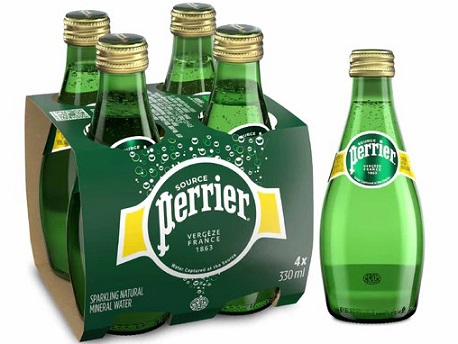More Than 2 Million Bottles Of Perrier Ordered Destroyed After Fecal Bacteria Was Found In Stocks!
Nikhil Prasad Fact checked by:Thailand Medical News Team Apr 26, 2024 1 year, 55 minutes ago
Health News: In a stunning turn of events that has reverberated throughout the global beverage industry, the French government has issued a directive for the destruction of two million bottles of Perrier, a globally recognized sparkling water brand. This drastic measure was taken following discovery of contamination with "faecal" bacteria, sending shockwaves through consumers and stakeholders alike.
 Fecal Bacteria Found In Stocks Of Perrier Water.
The Destruction of Perrier Bottles
Fecal Bacteria Found In Stocks Of Perrier Water.
The Destruction of Perrier Bottles
The French public health agency's order to Nestle Waters France mandated the disposal of all Perrier production from March 10 to 14, originating from a source near Nimes in the Occitanie region. This action, while aimed at safeguarding public health, also underscores the potential risks associated with inadequate quality control measures.
Nestle, in response to the directive, confirmed the destruction of approximately two million bottles, citing precautionary measures to ensure consumer safety. The company emphasized that Perrier bottles available in stores are deemed safe for consumption. Nevertheless, the scale of destruction highlights the severity of the contamination concerns and the imperative for stringent quality assurance protocols.
Various
Health News coverages on the development did not specify as to what quantities of stocks had been already released to the local and global markets and which markets. Hence, consumers have to be wary of ordering Perrier in leading restaurants or bars etc. There was no reports if product recalls would also be initiated in other countries around the world.
There were also no reports of genomic sequencings or genetic testing to see if the fecal contaminants were from local French nationals or illegal immigrants from Africa or the Middle East.
It should be noted that on ingestion of water contaminated with feces containing pathogens can cause infectious diseases such as cholera and other diarrheal diseases, dysenteries, and enteric fevers. Even death an occur in some times.
https://www.ncbi.nlm.nih.gov/pmc/articles/PMC4011876/
Criminal Investigation and Purification Methods
The criminal investigation into Nestle's water purification methods casts a shadow over the company's operational integrity. Central to these inquiries are allegations of using illegal means to purify mineral water, including the unauthorized use of UV lamps and carbon filtering techniques. These practices, if substantiated, raise serious questions about compliance with regulatory standards and consumer trust.
The investigation extends beyond Perrier to encompass other brands under Nestle's umbrella, including Vittel, Contrex, and Hepar. French prosecutors initiated inquiries in January, focusing on potential fraudulent treatment of water sources primarily located in eastern France. The r
evelation of unapproved purification methods has heightened scrutiny and eroded confidence in Nestle's adherence to industry standards.
Repercussions on Water Sources and Industry Impact
The fallout from the Perrier contamination scandal extends beyond the immediate destruction of bottles. Following rigorous checks and assessments, several water sources in eastern and southern France faced closure or reclassification as "water made drinkable through treatment." This development underscores systemic vulnerabilities and lapses in oversight within the water industry.
The French health agency's assertion of fraudulent treatment by operators before these closures highlights the urgent need for enhanced monitoring and regulatory enforcement. The incident has shaken the foundations of France's water industry, prompting calls for comprehensive reforms, stricter adherence to standards, and proactive measures to prevent future incidents.
Lessons Learned and Future Challenges
The Perrier contamination scandal serves as a sobering lesson for the water industry, emphasizing the paramount importance of regulatory compliance, transparent practices, and consumer safety. It underscores the interconnected nature of public health, environmental stewardship, and corporate responsibility in the beverage sector.
Moving forward, stakeholders must prioritize sustainability, ethical practices, and robust quality control mechanisms. Collaborative efforts between industry players, regulators, and public health authorities are imperative to rebuild trust, address systemic vulnerabilities, and restore confidence in the integrity of mineral water sources.
Conclusion: Toward a Resilient and Transparent Water Industry
The Perrier contamination incident and subsequent destruction of two million bottles serve as a catalyst for transformative change within the water industry. It underscores the critical imperative for accountability, transparency, and proactive risk management strategies.
As stakeholders navigate the aftermath of this crisis, they must commit to implementing stringent quality assurance protocols, fostering transparency, and upholding the highest standards of environmental and public health protection. By learning from past failures, embracing innovation, and fostering a culture of integrity, the water industry can emerge stronger, more resilient, and better equipped to confront evolving challenges while safeguarding consumer trust and well-being.
As a parting advice, be careful the next time you are at a fancy restaurant or ‘watering-hole’ as ordering a Perrier could make you end up literally drinking the shit of some illegal migrants in France!
For the latest
Health News, keep on logging to Thailand Medical News.
